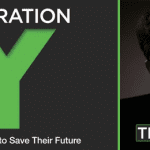Just enjoyed another Catalyst 2013 Lab session in Atlanta, this one with Bethany Hoang, Tyler Wigg-Stevenson, and Peter Greer. [See my recent interview with Peter here.] Their session was cleverly titled “Fad, Fatigue, or Fidelity? Doing Good and Living our Calling for the Long Haul.”
It’s topic I’ve written a bit about as I’ve uncovered my own identity as someone called to equip Christians to think, live, and lead with abundant faith. [See my Interview with Brad Lomenick on The Catalyst Leader and Life Calling.]
Tyler Wigg-Stevenson, author of The World Is Not Ours to Save, opened by arguing that we have reached a pivot point in our efforts to change the world through evangelical entrepreneurship. In essence, we jumped in some years ago with a lot of passion but met stiff resistance. It’s turned out to be harder than we thought it would be. So we’re now taking stock of where we are. In many ways, this Catalyst conference with its theme of KNOWN is Catalyst turning inward as we ask, “What is at our core?”
Tyler wisely noted that our greatest impact is in our families — yet within three generations, our names will likely be forgotten by even our own family. So balancing mission and family is not a position of stasis, but an ongoing process we must continually monitor.
Peter Greer, author of The Spiritual Danger of Doing Good, added that some of the fruit we see in the evangelical social-cause movement is actually rotten on the inside. We need to either get grounded again or we set ourselves up for failure. The danger, he wisely noted, is that we suddenly start to believe that we are the center of the story. When we think we’re at the center of what it means to do good we
- Undermine our impact – When we put our efforts to do good on center-stage, we impose our solutions on to others. In the process, we offend those we supposedly want to help and shut down potentially productive partnerships.
- Undermine our family – We don’t have to look far to find many stories of fractured families left in the wake of our good work. One study Peter shared noted that 80% of pastor’s wives think that their spouse is overworked. That can’t be good in the long run.
- Undermine our faith – The theme of Catalyst is that we are already known by God as we are not as we think we should be. It’s possible to do sacrificial, world-changing work without it ever connecting with our relationship with Christ.
Bethany Hoang, author of Deepening the Soul for Justice, shared how she was first captivated by the horror of rape for profit that drives the dark industry of sex trafficking. As the Director for the Institute of Biblical Justice for International Justice Mission, she has faced the realization that the problem is far bigger than anyone of us previously realized. In short, she shared her perspective that we’re just at the beginning of knowing the horrors of this world. Her question about eh challenge before us is how do we step into the areas of great need without becoming crushed by the weight of it? Her book Deepening the Soul for Justice is about the connection between justice and spiritual formation. She has been realizing more and more how strung out we can become if we’re not deeply rooted in the work of Christ.
In response to a question about correcting course so that we don’t become the hero, Peter Greer suggested the book How the Mighty Fall by Jim Collins to show that success can destroy leaders.
I found the most interesting question from the attendees to be about the trends that the three see in this area of concern. Their answers follow:
- Peter expects the problem to grow in the short-term as the reality becomes more evident that leaders have invested too heavily in doing good to the neglect of families. Then we can begin fixing our priorities and what defines us instead of becoming consumed with a narcissistic infatuation. Tyler believes that big ships turn slowly and that we are just at the beginning of this awakening. He urged patient perseverance as we raise the issue and address it.
- Bethany Hoang noted exhaustion and the fresh need to understand a Sabbath rest grounded in God’s sovereignty. We can rest because He is at work or we run the risk of helping more than hurting.
- Tyler noted on a theological note that we often fail to see how tragic sin is. There are things that we simply cannot undo apart from the return of Christ. The reality that he candidly acknowledged is that “I am exactly what’s wrong with the world. There’s no grand plan God needs of us except to become like Christ.”
Well said. Explore more about how doing good can be deadly in my post: Dear God, Why I’m Breaking Up with Doing Good. And subscribe in the upper right for more updates from Catalyst 2013!













